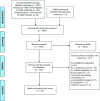The methods of improving cultural sensitivity of depression scales for use among global indigenous populations: a systematic scoping review
- PMID: 38161748
- PMCID: PMC10755398
- DOI: 10.1017/gmh.2023.75
The methods of improving cultural sensitivity of depression scales for use among global indigenous populations: a systematic scoping review
Abstract
Cultural adaptation of psychometric measures has become a process aimed at increasing acceptance, reliability, and validity among specific Indigenous populations. We present a systematic scoping review to: (1) identify the depression scales that have been culturally adapted for use among Indigenous populations worldwide, (2) globally report on the methods used in the cultural adaptation of those scales, and (3) describe the main features of those cultural adaptation methods. We included articles published from inception to April 2021, including 3 levels of search terms: Psychometrics, Indigenous, and Depression. The search was carried out in the Ovid Medline, PubMed, Embase, Global Health, PsycINFO, and CINAHL databases, following PRISMA guidelines. We identified 34 reports on processes of cultural adaptation that met the criteria. The scales were adapted for use among Indigenous populations from Africa, Australia, Asia, North America, and Latin America. The most common scales that underwent adaptation were the Patient Health Questionnaire (PHQ-9), the Center for Epidemiologic Studies Depression Scale (CES-D), and the Edinburgh Postnatal Depression Scale (EPDS). Methods of adaptation involved a revision of the measures' cultural appropriateness, standard/transcultural translation, revision of the administration process, and inclusion of visual supports. Culturally safe administration of scales was reported in some studies. To come to a consensus on most appropriate methods of improving cultural safety of psychometric measurement, most studies utilized qualitative methods or mixed methods to understand the specific community's needs. Revision of linguistic equivalence and cultural relevance of content, culturally safe administration procedures, qualitative methods, and participatory research were key features of developing safe culturally adapted measures for depressive symptoms among Indigenous populations. While for comparability, uniform scales would be ideal as mental health evaluations, an understanding of the cultural impact of measurements and local depression expressions would benefit the process of developing culturally sensitive psychometric scales. PROSPERO registration ID: CRD42023391439.
Keywords: Indigenous; cross-cultural psychiatry; culturally competent care; depression; psychometrics.
© The Author(s) 2023.
Conflict of interest statement
The authors declare none.
Figures
Similar articles
-
Safe and valid? A systematic review of the psychometric properties of culturally adapted depression scales for use among Indigenous populations.Glob Ment Health (Camb). 2023 Sep 14;10:e60. doi: 10.1017/gmh.2023.52. eCollection 2023. Glob Ment Health (Camb). 2023. PMID: 37854390 Free PMC article. Review.
-
Validation of the culturally adapted Edinburgh postpartum depression scale among east Asian, southeast Asian and south Asian populations: A scoping review.Int J Ment Health Nurs. 2023 Dec;32(6):1616-1635. doi: 10.1111/inm.13202. Epub 2023 Aug 13. Int J Ment Health Nurs. 2023. PMID: 37574716
-
Cultural adaptation of health interventions including a nutrition component in Indigenous peoples: a systematic scoping review.Int J Equity Health. 2021 May 22;20(1):125. doi: 10.1186/s12939-021-01462-x. Int J Equity Health. 2021. PMID: 34022886 Free PMC article.
-
Beyond the black stump: rapid reviews of health research issues affecting regional, rural and remote Australia.Med J Aust. 2020 Dec;213 Suppl 11:S3-S32.e1. doi: 10.5694/mja2.50881. Med J Aust. 2020. PMID: 33314144
-
A systematic review of EPDS cultural suitability with Indigenous mothers: a global perspective.Arch Womens Ment Health. 2021 Jun;24(3):353-365. doi: 10.1007/s00737-020-01084-2. Epub 2020 Nov 27. Arch Womens Ment Health. 2021. PMID: 33245435 Free PMC article.
Cited by
-
Safe and valid? A systematic review of the psychometric properties of culturally adapted depression scales for use among Indigenous populations.Glob Ment Health (Camb). 2023 Sep 14;10:e60. doi: 10.1017/gmh.2023.52. eCollection 2023. Glob Ment Health (Camb). 2023. PMID: 37854390 Free PMC article. Review.
-
Development of a self-management behavior assessment scale for liver cancer patients from ethnic minorities.BMC Health Serv Res. 2025 Feb 25;25(1):315. doi: 10.1186/s12913-025-12272-0. BMC Health Serv Res. 2025. PMID: 40001076 Free PMC article.
-
The Importance of Standardized Assessment.Mov Disord Clin Pract. 2024 Dec;11 Suppl 3(Suppl 3):S15-S20. doi: 10.1002/mdc3.14085. Epub 2024 May 26. Mov Disord Clin Pract. 2024. PMID: 38798017 Free PMC article. No abstract available.
References
-
- Almeida OP, Flicker L, Fenner S, Smith K, Hyde Z, Atkinson D, Skeaf L, Malay R and LoGiudice D (2014) The Kimberley assessment of depression of older indigenous Australians: Prevalence of depressive disorders, risk factors and validation of the KICA-dep scale. PLoS One 9(4), e94983. 10.1371/journal.pone.0094983. - DOI - PMC - PubMed
-
- American Psychiatric Association (2023) About DSM-5-TR. Available at https://www.psychiatry.org/psychiatrists/practice/dsm/about-dsm.
-
- Amnesty International (2023) Indigenous Peoples. Available at https://www.amnesty.org/en/what-we-do/indigenous-peoples/.
Publication types
LinkOut - more resources
Full Text Sources
Miscellaneous


